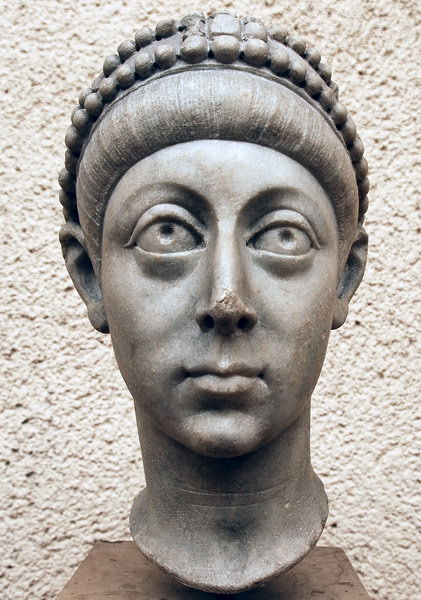Synesius, On Imperial Rule 1
 In his speech On Imperial Rule (or On Monarchy), Synesius of Cyrene offers some advise to the emperor Arcadius (r.395-408). More information about this speech, together with a brief summary, can be found here.
In his speech On Imperial Rule (or On Monarchy), Synesius of Cyrene offers some advise to the emperor Arcadius (r.395-408). More information about this speech, together with a brief summary, can be found here.
Throughout this speech, the word "Scythians" refers to the Tervingian Germans (who would later be known as Visigoths), whereas "king" refers to emperor.
The text is offered here in the translation by A. Fitzgerald. The four-digit numbers are page numbers of the Migne edition.
On Imperial Rule 1
[1] [1053] Must a man abase his glance in entering here, if he carry not with him his city's prestige, as though he had no freedom even to open his mouth in a royal palace unless he has come from a community great and wealthy, and bears with him majestic words, ay, and proud ones also, even such offspring as rhetoric and poetry bring forth, arts and products of the common herd as they are? May he not, without the prestige of his fatherland, purvey the pleasure of delightful and time-honored speeches of praise to win over king and council?
[2] Nay, will you for once admit philosophy to dwell with you and will anyone not fail to recognize her appearing here after so long an interval,note or to treat her as the welcome guest and plainly speak some good of her in the presence of those whom it befits? There is need, methinks, of all this, not for her sake but for your own, lest perchance if despised she may become of no value for you.
[3] She, however, shall furnish her discourses, not those of a gay type calculated to allure the young, nor such words as are dissolute of morality or bedecked with phrases for a demonstration of false beauty; but in a different way, one weighty and inspired for those able to attain it, she will employ words virile and sacred, words which disdain to court the bounty of the great by servile adulation. So then they stand firmly, they are those that dare all things, strangers in a royal palace to such a degree as to assert that it will not suffice them if anyone agrees to their passing over the king and all his possessions without praise of every sort, but that they stand ready to wound if opportunity be given and threaten to bite into the heart,note not on the surface only, [1056] but to the very core, if so perchance anyone may be helped by suffering.
[4] Freedom of speech should be of great price in the ears of a monarch. Praise at every step is seductive, but it is injurious. It seems to me to resemble those potions, coated with honey, which are offered to men condemned to death. Do you not know that the practice of cookery by its artful seasonings and by summoning up false cravings, is injurious to our bodies, whereas both gymnastics and the art of the physician are saving to them, although they give us pain for the moment?
[5] As to you, I desire that you should be saved, even if you have to suffer in the path of salvation. The very bitterness of salt forbids meat to be corrupted, and truth in discourses preserves the mind of a young sovereign from such paths as the license of power might be open to him. Endure, therefore, the strangeness of my words. Let none among you condemn them as uncouth, nor silence them off-hand for that they are not servants of persuasion, pleasant playmates to the young, but pedagogues of a sort, actually their preceptors and stern to encounter. May you be able to bear with intercourse of this sort, and may your ears not be utterly corrupted by the praises which you want to hear.
Lo, I myself stand before you.note